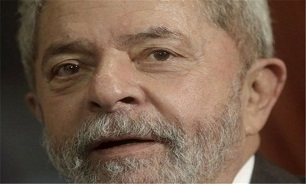Brazil Top Court Ruling Could Free Jailed Former President Lula
 The reinterpretation of Brazil's penal code, allowing convicts to exhaust their appeal options before being locked up, could benefit dozens of high-profile prisoners, among them Lula, jailed last year for corruption.
The reinterpretation of Brazil's penal code, allowing convicts to exhaust their appeal options before being locked up, could benefit dozens of high-profile prisoners, among them Lula, jailed last year for corruption.
The 74-year-old left-wing leader, who was president between 2003 and 2010, had been favoured to win the 2018 election but his imprisonment barred him from running.
Nearly 5,000 convicts could potentially benefit from the ruling that has been criticised by the country's justice minister, Al Jazeera reported.
By a 6-5 vote, the court overturned a three-year-old rule that contributed to the success of Brazil's biggest corruption investigation, the so-called Car Wash operation that put dozens of company executives and politicians in jail for bribes and kickbacks.
The prospect of serving immediate prison time after losing a first appeal encouraged suspects to negotiate plea deals with prosecutors, providing them information that helped unravel the biggest corruption scheme in Brazil's history.
The Car Wash prosecutors said the ruling would make their job harder and favour impunity because of Brazil's "excessive" appeal processes. They said in a statement that the court's decision was out of sync with a country that wants an end to corruption.
Lula's lawyers said they would seek his immediate release by the lower court that convicted him. He was jailed in 2018 for eight years and 10 months after he was found guilty of taking bribes from engineering firms in return for government contracts.
Polarised Country
Lula, Brazil's first working-class president, left office with sky-high popularity ratings thanks to social policies that raised millions from poverty, but his critics say he ruined the country by allowing corruption to flourish.
His release would heighten tensions in a polarised nation that elected far-right President Jair Bolsonaro last year.
If and when he is released, Lula would be free to engage in politics but would not be eligible under Brazil's Clean Record law to seek elected office for eight years after his first conviction in June 2017.
"Lula is not electable, but that is not needed for him to take centre stage," political analyst Alberto Almeida said.
"He can draw more politicians from the centre and end up as a dealmaker for his party's candidate in the 2022 presidential elections."
His Workers Party welcomed the court's decision. Its leader, Gleisi Hoffmann, called it "a very important step to strengthen democracy and the constitution at a time when they are under threat from an extreme-right government."
Sergio Moro, the Car Wash trials judge who sentenced Lula and is now justice minister in Bolsonaro's government, warned before the court's decision that overturning the rule would be a big setback for the fight against corruption.
According to the National Council of Justice, some 4,895 convicts could potentially benefit from the rule change.
Message end/
